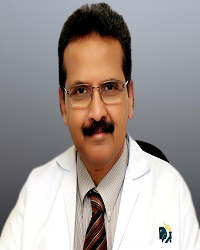Search Result: 2

Dr Madhu Sudhanan
MBBS., MS., Mch., ( GI Surgery )
Registration No
1779069
Language
English, हिंदी, ಕನ್ನಡ, தமிழ்

14 years experience overall

KK Nagar , Madurai
MON- SAT, MON- SAT(12:00 PM-02:00 PM)

Dr Sekar T V
MBBS, MS, FRCS( Glasgow -UK)
Registration No
30955
Language
English, ಕನ್ನಡ, தமிழ்

45 years experience overall

KK Nagar , Madurai
MON, TUE, THU- SAT, MON, TUE, THU- SAT(09:30 AM-02:00 PM)
Frequently Asked Questions for Kidney Transplant in Madurai
The selection of a donor kidney involves careful matching based on factors such as blood type, tissue compatibility, and antibody levels. The organ allocation system prioritizes patients based on medical urgency, waiting time, and other factors to ensure fair distribution. The goal is to find the best match for each recipient to minimize the risk of rejection.
The biggest problem with kidney transplants is the shortage of donor organs compared to the number of patients waiting for transplantation. This leads to long waiting times and delays in receiving a transplant. Efforts are being made to increase organ donation rates through public awareness and deceased organ donation programs.
Dialysis is a life-saving treatment that helps remove waste products from the blood when the kidneys fail. However, it is not a permanent solution and requires regular sessions. Kidney transplant offers a better quality of life and long-term survival but carries risks such as rejection, infection, and the need for lifelong immunosuppressive medications.
Yes, a male can receive a kidney from a female donor, and vice versa. The most important factors for successful transplantation are compatibility of blood types and tissue matching between the donor and recipient. Gender does not play a significant role in determining compatibility.
Age alone is not a barrier to kidney transplantation. The decision to perform a kidney transplant in older adults is based on a thorough evaluation of overall health and potential risks. Older patients may have a higher risk of complications, but with careful selection and management, they can still have successful outcomes.
Yes, many people who undergo successful kidney transplants can live a normal life. After recovery, they can resume regular activities, work, travel, and enjoy an improved quality of life. However, they will need to take medications and follow up with their transplant team for regular monitoring.
Eligibility criteria for kidney transplant may vary depending on the specific hospital and country regulations. Generally, candidates should have end-stage renal disease, be in good overall health, have no active infections or cancers, and be willing to comply with post-transplant care requirements. Age and other factors may also be considered.
The time required to complete a kidney transplant varies depending on factors such as availability of a suitable donor organ and the patient’s health condition. From the initial evaluation to the actual surgery, it can take several months. The surgery itself usually takes several hours.
There are many reputable hospitals that specialize in kidney transplantation. It is important to choose a hospital that has experienced transplant surgeons, a dedicated transplant team, the availability of rehabilitation services and a high success rate. Researching and seeking recommendations from healthcare professionals can help you identify the best hospital for your needs.
After a kidney transplant, you will need to take medications to prevent rejection of the new kidney and monitor your health closely. You will need regular follow-up visits with your transplant team, including blood tests, imaging studies, and medication adjustments. It is important to maintain a healthy lifestyle and follow your doctor’s instructions.
Preparation for kidney transplant involves a series of tests and evaluations to determine if you are a suitable candidate for the procedure. This includes blood tests, imaging studies, and consultations with various specialists. You will also need to undergo a thorough medical evaluation to assess your overall health.
The recovery time after a kidney transplant varies from person to person. Generally, patients stay in the hospital for about a week after the surgery and may need several weeks to a few months to fully recover. Regular follow-up visits are required to monitor the progress.
The success rate of kidney transplant varies depending on various factors, including the health of the recipient and the quality of the donor organ. Generally, the success rate is high, with an average survival rate of around 90% after one year and 70-80% after five years. The success rate is even higher for younger patients and those who are in good overall health.
To find the best doctors for kidney transplant, you can start by researching and identifying hospitals that specialize in renal transplantation. Look for hospitals with experienced transplant surgeons and high success rates. It is also helpful to seek referrals from your primary care physician or nephrologist.
Kidney transplants are performed by transplant surgeons who specialize in renal transplantation. These surgeons work closely with a team of healthcare professionals including nephrologists, anesthesiologists, and nurses to ensure the success of the procedure.
A kidney transplant is a surgical procedure in which a healthy kidney from a living or deceased donor is transplanted into a person with end-stage renal disease (ESRD
A doctor who performs kidney transplants should be a qualified transplant surgeon specializing in renal transplantation. They should have completed specialized training in transplant surgery and have experience in managing patients with kidney disease.
Related Procedures in Madurai
Related Treatments in Madurai
Other Specialities in Madurai
- Best Urologist in Madurai
- Best Pulmonologist in Madurai
- Best General Physician in Madurai
- Best Endocrinologist in Madurai
- Best Cardiologist in Madurai
- Best Oncologist in Madurai
- Best Radiologist in Madurai
- Best Orthopedics in Madurai
- Best Hepatologist in Madurai
- Best Gynecologist in Madurai
- Best Dermatologist in Madurai
- Best Gastroenterologist in Madurai
- Best Psychologist in Madurai
- Best Ent Specialist in Madurai
- Best Nephrologist in Madurai
- Best Rheumatologist in Madurai
- Best Diabetologist in Madurai
- Best Psychiatrist in Madurai
- Best Neonatologist in Madurai
- Best Dentist in Madurai
- Best Dietitian in Madurai
- Best Haematologist in Madurai
- Best Pediatrics in Madurai
- Best General Surgeon in Madurai
Top Hospitals in India
- Hospitals in Ahmedabad
- Hospitals in Bangalore
- Hospitals in Bhubaneswar
- Hospitals in Bilaspur
- Hospitals in Chennai
- Hospitals in Delhi
- Hospitals in Guwahati
- Hospitals in Hyderabad
- Hospitals in Indore
- Hospitals in Kolkata
- Hospitals in Madurai
- Hospitals in Mumbai
- Hospitals in Mysore
- Hospitals in Nashik
- Hospitals in Noida
- Hospitals in Visakhapatnam
- Hospitals in Lucknow
- Hospitals in Bhopal
- Hospitals in Karur
- Hospitals in Kochi
- Hospitals in Nellore
- Hospitals in Trichy
- Hospitals in Kakinada
© Copyright 2024. Apollo Hospitals Group. All Rights Reserved.




 Call Now
Call Now


